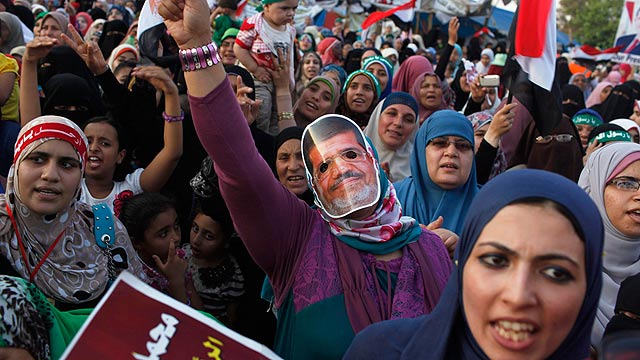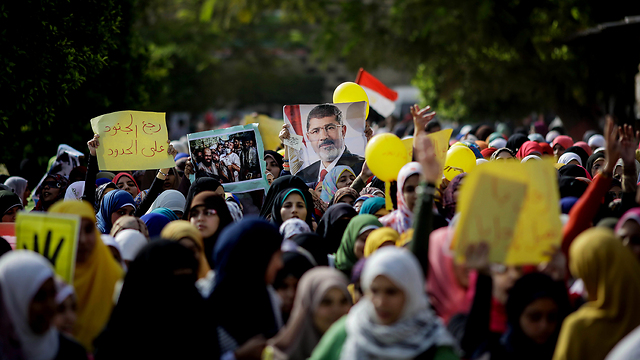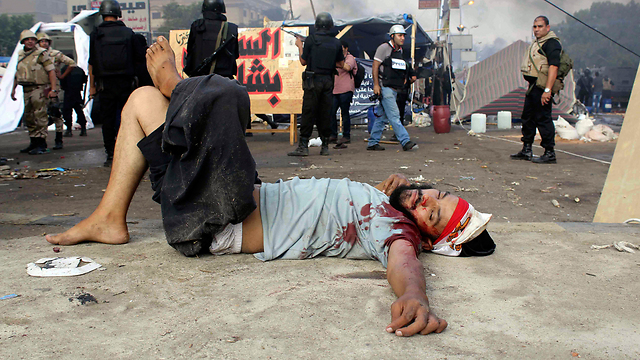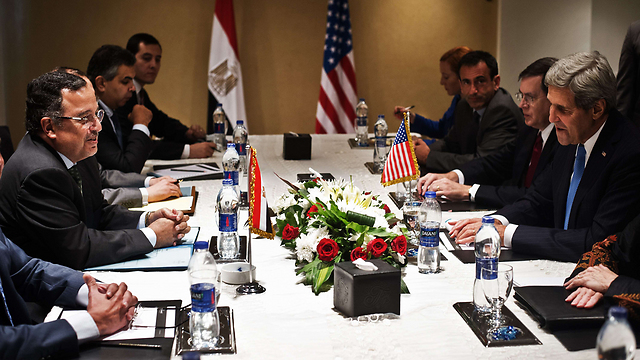Foreign Minister Nabil Fahmy's comments provided the most specific timeline yet for the end of the interim army-backed government and a return to electoral politics in the Arab world's most populous state, which since Morsi's ouster in July has seen some of the worst violence in its modern history.
Related stories:
- Morsi from jail: Our troubles serve Israeli interests
- Egypt to try Morsi for protester deaths
- Kerry in Egypt on first visit since Morsi ouster
About 2,000 Brotherhood supporters gathered near the Rabaa al-Adawiya mosque in a Cairo suburb, scene of one of two pro-Morsi protest camps crushed by security forces in August, when hundreds of protesters were killed in the capital.

Morsi supporters in Cairo (Archive: Reuters)
They were prevented from reaching the mosque by soldiers who blocked a street, using a loud hailer to warn protesters off, a Reuters witness said. Women and children were among the protesters chanting for Morsi's return to office and denouncing what they call military rule of the country.

Morsi supporters in Cairo (Photo: AP)
In Giza, a 12-year-old boy was shot and killed in clashes between residents and supporters of Morsi, security sources said. The Interior Ministry said in a statement that 19 supporters of the Muslim Brotherhood were arrested.
In Alexandria, police fired tear gas at a march of 500-600 Brotherhood supporters in the neighborhood of the prison where Morsi is being held, a security source said.

Man wounded in violent protests (Archive: AP)
Morsi's Brotherhood failed in an attempt on Wednesday to overturn a court ruling banning it. Morsi himself is on trial on charges of inciting violence during his rule.
Fahmy told Reuters in an interview that the Freedom and Justice Party, the political arm of the Muslim Brotherhood, "is still legal in Egypt" and free to participate in the parliamentary election.
Speaking during a visit to Spain, he said presidential elections would be announced "by the end of next spring" and that the elections would be held a maximum of two months after the announcement.
"So you're looking at elections in the summer for president. That's the last step," he said.
He had said in September that the transitional phase of government should end "by next spring", though he did not give specific dates at that time.
The elections will come after a referendum on a new constitution, which Fahmy said would be held in December. A 50-member committee is working on amending a constitution that was drafted under Morsi by an Islamist-dominated assembly.
Since July, the army-backed government has carried out a security crackdown on the Brotherhood. Its leaders are behind bars, as are more than 2,000 of its members and supporters. Hundreds of Islamists have been killed since the army takeover.
The Brotherhood says the army action can be described only as a coup, while the army says it was merely acting on the wishes of the people to dampen a resurgence of violence.
US Aid
The United States has questioned the democratic credentials of Egypt's army-backed rulers. Last month, Washington curtailed military aid to Egypt, which has long been the second-largest recipient of US aid after Israel and a key regional ally.

Kerry with Egyptian FM Fahmy (Photo: AFP)
US officials said the aid cut reflected Washington's unhappiness with Egypt's path since Morsi was deposed.
Fahmy has since called the state of Washington's ties with its longtime Arab ally "turbulent" and suggested that Egypt would look beyond the United States to meet its security needs. He has repeatedly named Russia as a partner with whom Cairo hopes to deepen ties.
"I sense a desire and see an interest in expanding military cooperation with Russia," he said. "That does not mean that we will not expand military cooperation with the US at the same time," he added, a step down from his recent sharp critiques of Washington.
Russia's foreign and defense ministers will arrive in Cairo on Wednesday for talks, foreign ministry spokesman Alexander Lukashevich said. The talks would cover regional issues "as well as strengthening Russian-Egyptian cooperation in various areas, including political, arms trade and economy."
Fahmy said Egypt had "moved forward more than people think", referring to the transitional period. He acknowledged, however, that the government was grappling with turmoil:
"We need to get a full hand on the security issues in Egypt but that is progressing, so we can receive tourists again," he said.
The summer of bloodshed following Morsi's ouster frightened away all but the bravest foreign visitors, a heavy blow to an industry that has suffered greatly from nearly three years of upheaval following the 2011 uprising that ousted autocratic president Hosni Mubarak.
- Receive Ynetnews updates
directly to your desktop















